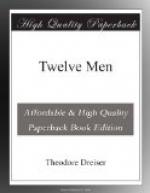It was the same with “On the Banks of the Wabash,” possibly an even greater success, for it came eventually to be adopted by his native State as its State song, and in that region streets and a town were named after him. In an almost unintentional and unthinking way I had a hand in that, and it has always cheered me to think that I had, although I have never had the least talent for musical composition or song versification. It was one of those delightful summer Sunday mornings (1896, I believe), when I was still connected with his firm as editor of the little monthly they were issuing, and he and myself, living with my sister E——, that we had gone over to this office to do a little work. I had a number of current magazines I wished to examine; he was always wishing to compose something, to express that ebullient and emotional soul of his in some way.
“What do you suppose would make a good song these days?” he asked in an idle, meditative mood, sitting at the piano and thrumming while I at a nearby table was looking over my papers. “Why don’t you give me an idea for one once in a while, sport? You ought to be able to suggest something.”
“Me?” I queried, almost contemptuously, I suppose. I could be very lofty at times in regard to his work, much as I admired him—vain and yet more or less dependent snip that I was. “I can’t write those things. Why don’t you write something about a State or a river? Look at ’My Old Kentucky Home,’ ‘Dixie,’ ’Old Black Joe’—why don’t you do something like that, something that suggests a part of America? People like that. Take Indiana—what’s the matter with it—the Wabash River? It’s as good as any other river, and you were ‘raised’ beside it.”
I have to smile even now as I recall the apparent zest or feeling with which all at once he seized on this. It seemed to appeal to him immensely. “That’s not a bad idea,” he agreed, “but how would you go about it? Why don’t you write the words and let me put the music to them? We’ll do it together!”
“But I can’t,” I replied. “I don’t know how to do those things. You write it. I’ll help—maybe.”
After a little urging—I think the fineness of the morning had as much to do with it as anything—I took a piece of paper and after meditating a while scribbled in the most tentative manner imaginable the first verse and chorus of that song almost as it was published. I think one or two lines were too long or didn’t rhyme, but eventually either he or I hammered them into shape, but before that I rather shamefacedly turned them over to him, for somehow I was convinced that this work was not for me and that I was rather loftily and cynically attempting what my good brother would do in all faith and feeling.
He read it, insisted that it was fine and that I should do a second verse, something with a story in it, a girl perhaps—a task which I solemnly rejected.
“No, you put it in. It’s yours. I’m through.”




